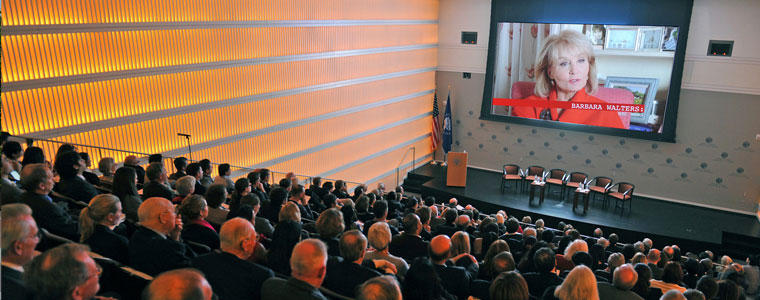Assignment: China
The U.S.-China Institute at the University of Southern California has produced a new documentary film, Assignment: China – The Week that Changed the World. Written and narrated by Mike Chinoy, formerly CNN’s senior Asia correspondent and Beijing bureau chief, the film uses previously unreleased footage and interviews with the reporters and officials who accompanied President Richard Nixon to tell the behind-the-scenes story of the media coverage of the trip that changed the course of U.S.-China relations. The United States Institute of Peace and the State Department’s East Asian and Pacific Affairs Bureau hosted a screening of Assignment: China, followed by a conversation featuring some of those who traveled to China with Nixon.

February marks the 40th anniversary of President Richard Nixon’s historic visit to China. The trip was also a milestone in the history of journalism. Since 1949, the Chinese government had barred virtually all American reporters. For the Nixon visit, however, China agreed to accept nearly 100 correspondents, and to allow the most dramatic events to be televised live.
The U.S.-China Institute at the University of Southern California has produced a new documentary film, Assignment: China – The Week that Changed the World. Written and narrated by Mike Chinoy, formerly CNN’s senior Asia correspondent and Beijing bureau chief, the film uses previously unreleased footage and interviews with the reporters and officials who accompanied Nixon to tell the behind-the-scenes story of the media coverage of the trip that changed the course of U.S.-China relations.
The United States Institute of Peace and the State Department’s East Asian and Pacific Affairs Bureau hosted a screening of Assignment: China, followed by a conversation featuring some of those who traveled to China with Nixon.
Explore Further
- Assignment: China
News Feature by Thomas Omestad
- Richard Solomon, Welcoming Remarks
President, United States Institute of Peace - Kurt Campbell, Remarks
Assistant Secretary for East Asian and Pacific Affairs, Department of State
- Mike Chinoy, Introduction
Senior Fellow, U.S.-China Institute, University of Southern California
Former CNN senior Asia correspondent
- Dwight Chapin, Panelist
Former appointments secretary for President Nixon - Bernard Kalb, Panelist
Former New York Times/CBS News/NBC News correspondent - Stanley Karnow, Panelist
Former Washington Post Asia Hong Kong correspondent - Robert Keatley, Panelist
Former correspondent, Wall Street Journal, Editor, Asian Wall St. Journal, Editor South China Morning Post - Tara Sonenshine, Moderator
Executive Vice President, United States Institute of Peace
A reception hosted by Acting Assistant Secretary of State for Public Affairs Mike Hammer followed the panel discussion.



